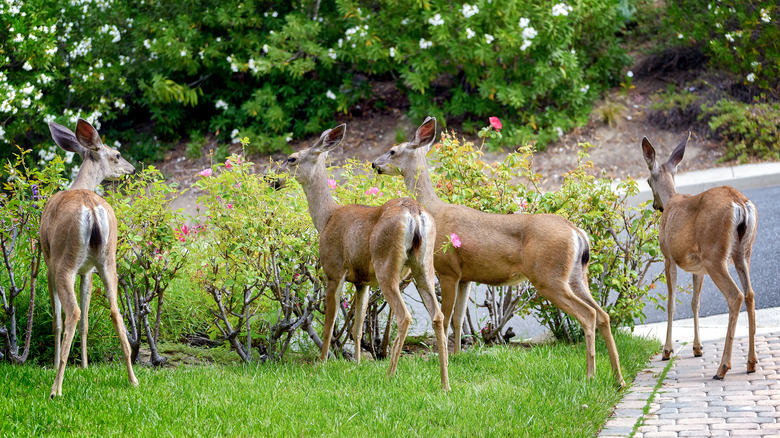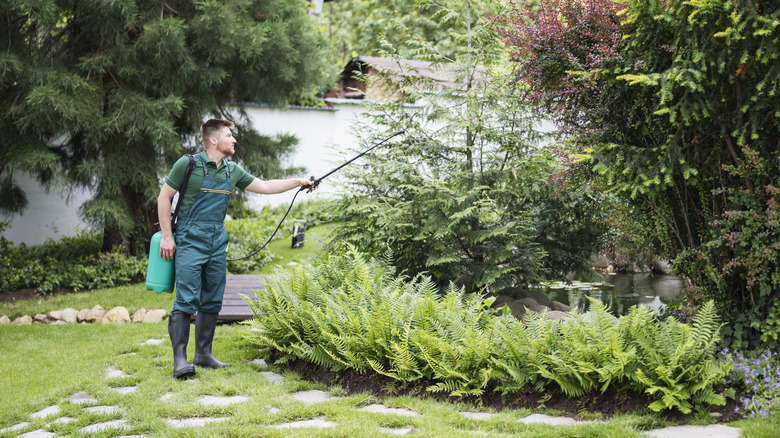What To Know Before Using Liquid Fence To Keep Pests Out Of The Garden
For those who have deer, rabbits, or other wildlife creatures that come into their yard and chomp away at flowers and vegetables, a product like Liquid Fence seems to be the ideal solution. This product allows you to create a barrier around the exterior of your garden or yard that discourages these pests from coming into your space for their next meal. Some of these products seem to work when placed properly and maintained over time. Yet, like all treatments like this, there are both pros and cons to using Liquid Fence, especially to repel deer and rabbits who may have been lurking in your area for some time.
Liquid Fence is a type of chemical repellent, a product with a strong odor that is said to discourage plant-eating animals from munching on the surfaces where it's placed. There are several versions of this product, and all have slightly different ingredients. The deer and rabbit-specific product contains putrescent whole egg solids, garlic, thyme oil, sodium lauryl sulfate, and potassium sorbate. In short, these ingredients create an undesirable smell and taste. Because it has such a strong scent, the pest does not even have to bite down to know that this food source is off-limits. Liquid Fence is readily available in many home improvement stores, and there may also be other brands with a similar ingredient makeup available. Further, you could also DIY your own Liquid Fence concoction as well.
The benefits of using Liquid Fence
The ingredient makeup in Liquid Fence makes it an ideal concoction for creating a less-than-desirable odor and flavor that will deter herbivores from eating any of the surfaces where this product is placed. It does not cause harm to pests, and as long as you use it as the manufacturer states, there's no risk to pets either, though high levels can be toxic. It also shouldn't cause any damage to your plants. It's versatile enough to place on just about any type of vegetation that you may be concerned about including trees, shrubs, ornamental grasses, flowers, edible garden plants, and more.
Liquid Fence is a bit different from other barrier-type products because it doesn't wash away as easily. Some of the ingredients help it adhere to the surface of the vegetation, and though it will wear down over time, it may last much longer than other products. You can also use Liquid Fence at any time of the year, which may allow you to protect those first buds coming up in the spring that tend to be a rodent's favorite option, as well as the mums late in fall that deer may wish to eat. Overall, customers who use this product say it works to protect their favorite plants from damage and keep deer out of their yard.
The disadvantages of using Liquid Fence
Like all similar products, there are a few drawbacks to consider when using this pest barrier. This product is a spray that comes pre-mixed in an applicator. Though costs differ based on size and specific type, it can be an expensive way to keep animals out of your yard. There may be other similar products that cost a bit less, though they may not be as effective.
It's also notable that, though it's rain-resistant, that doesn't mean you just need a single application. As your plants grow, especially in the garden, they will need additional applications of the product to keep them protected. That means that every couple of weeks, you'll need to reapply this product to any of the new growth in your garden. To be effective at all, you'll need to apply it properly. The initial application must go on during a dry period, and you'll need to apply it a second time a week later and then monthly going forward.
Also notable is that it doesn't have a great smell, which is why rabbits and deer aren't attracted to it, but that makes it less desirable to people, too. Spraying this all over your yard means you'll likely have a pretty intensely-smelling space that you may not enjoy. For those who may be sensitive to strong odors, the robust garlic and rotten egg stench could mean you don't want to be outdoors. However, the scent doesn't linger for long.


